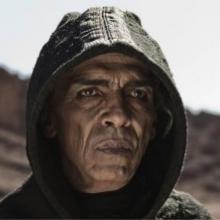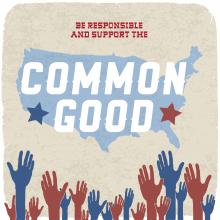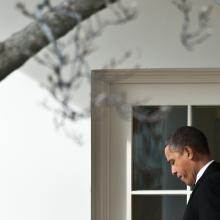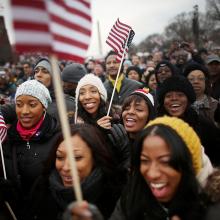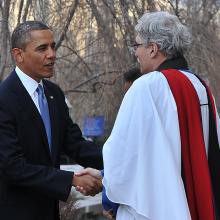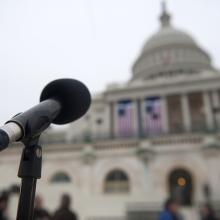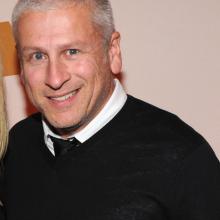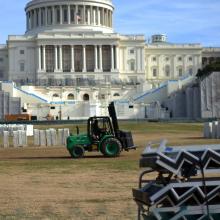Obama
The producers of History Channel’s The Bible fended off claims Monday that the actor who plays Satan in the miniseries resembles President Barack Obama.
Executive producers Mark Burnett, who created Survivor, and his wife, the actress Roma Downey, described the comparisons as “utter nonsense.”
“Both Mark and I have nothing but respect and love for our President, who is a fellow Christian. False statements such as these are just designed as a foolish distraction to try and discredit the beauty of the story of the Bible,” according to a statement from Downey, who starred in the television show Touched by an Angel.
Mehdi Ouazaani, the Moroccan actor who portrays Satan, has played satanic roles prior to his work on The Bible, the statement said.
The social media sphere blew up with the comparison Sunday night, which was touted by conservative commentator Glenn Beck, among others.
THE DAY BEFORE President Obama's second inauguration (campaign code name: "Neener, neener, neener!"), Republican Sen. Mitch McConnell sent an email to constituents with a message somewhat lacking in a spirit of new beginnings: "The gun-grabbers in the Senate are about to launch an all-out assault on the Second Amendment. They're coming for your guns."
This is disturbing. I don't have any guns, but I'm looking for places to hide them. And without guns, how will I protect my family from the coming assault? Can I hold off federal agents by flinging small appliances at them? Those I've got. In fact, I just got a new hand mixer. It's black and sleek, like the helicopters that will soon be circling over our homes. (Helicopter tip: Make sure the rotor blades have completely stopped before licking off the icing.)
Under Obama's new proposals, I'll probably have to register my appliances, or at least submit to a background check before I buy another one. Although I've heard you can avoid that if you get them at private appliance shows.
This latest attention to gun control prompted National Rifle Association leader Wayne LaPierre to take the stage and, looking directly into the eyes of the American people, vehemently deny that he is French. Additionally, he helpfully pointed out that "the only thing that stops a bad guy with a gun is a good guy with a gun." Or was it the other way around? To be honest I'm not sure what he said, because I got distracted by the wild look in his eyes, and the bits of saliva that gather in the corners of his mouth whenever he talks about guns. This guy really likes guns.
What I would ask Mr. "LaPierre" [giggle]—while keeping both hands out where he could see them—is this: How do you stop a good guy with a gun who's having a bad day? Or what if he's really depressed or angry at his boss for not allowing him to wear camouflage clothing to staff meetings?
Politics at its best serves the common good — far above any one interest or political party. And right now in Washington, we see that playing out as we continue to reach accord on immigration reform. But when it comes to our budget debate, partisan ideology and special interests are winning out over the common good.
The ever-looming “sequester” that was never supposed to happen goes into effect tomorrow. Billions of dollars will be cut from domestic and military spending without any plan or strategy; jobs will be lost and people will suffer. Public frustration is growing with our elected officials, while they continue to argue over the role of government instead of governing responsibly. The press discusses who wins and loses in the polls, but it is clear that it is the common good that is losing.
On the other hand, immigration reform is being discussed, at the same time with the same political players, in a very reasonable and hopeful way. On that important policy change, bipartisan work is going forward to shape legislation that could pass both houses of Congress.
There was truth tonight in the president’s State of the Union message.
There was truth that the rising costs of health care must indeed be addressed by serious reforms in our Medicare and healthcare system — but that it’s wrong to put most of that burden on vulnerable seniors, while protecting the most powerful special interests. Truth that you should not reduce the deficit by cuts in crucial investments in education, infrastructure, science, clean energy, or programs for the most vulnerable — but leave billions of dollars in tax loopholes and deductions for the wealthy and well-connected.
Truth in the compassionate and committed words about “poverty” and “poor” children and families who deserve our attention to find ladders up from poverty. Truth that no one who works full time in the wealthiest nation on earth should have to live in poverty but have a living wage. That quality pre-school should be available to every child in America to create stable and successful families.
The Obama administration is not living up to its promises. Sign a petition to put an end to low-priority deportations.
HOW MANY NUCLEAR weapons make us "safe"?
At the height of the Cold War, both the U.S. and the Soviet Union had tens of thousands of nuclear warheads, aimed at each other's cities, towns, and military targets. Not many felt that the world was somehow made safe by this hair-trigger, apocalypse-risking standoff.
The Soviet Union is long gone, but the Cold War mentality that fueled the era's nuclear arms race seems to linger on. According to a December report by the Federation of American Scientists, the world's combined stockpile of nuclear warheads is still more than 17,000. Of these, the report continues, "some 4,300 warheads are considered operational, of which about 1,800 U.S. and Russian warheads are on high alert, ready for use on short notice."
President Obama, for his part, has laid out what he called his "vision of a world without nuclear weapons." In a speech last March in Seoul, South Korea, Obama said the goal of a nuclear-free world "would not be reached quickly, perhaps not in my lifetime," but that it must begin "with concrete steps." He continued, the "massive nuclear arsenal we inherited from the Cold War is poorly suited for today's threats," and "we can already say with confidence that we have more nuclear weapons than we need." (That could be considered a gross understatement, since the next leading nuclear threat—China—has only about 50 warheads on ICBMs that could reach the U.S.)
AS WE MOVE along in 2013, more initiatives will be coming on line from Obamacare (technically the Patient Protection and Affordable Care Act, although if you rearrange the letters it spells "death panels"). Starting next year, insurance companies can no longer deny coverage for anyone with pre-existing conditions, which is good news for Mitch McConnell, who might want to have his permanent frown removed. Additionally, the law requires that all tea party members take a spoonful of castor oil before bedtime and wear coarse undergarments close to the skin. (Hey, it was a big bill, with lots of fine print.)
What won't change, however, is our relationship to the pharmaceutical industry, known as "Big Pharma"—which is not, as you may have thought, the nickname of a linebacker from one of our agricultural-state colleges, but rather shorthand for "companies that combine ground-breaking science with the business model of a crack dealer." No offense to crack dealers.
I recently had a personal experience with Big Pharma, after two weeks with a projectile cough that filled the middle distance with an alluring prismatic mist. Office colleagues did not appreciate my little air rainbows, so I contacted my doctor for advice, using the convenience of email rather than driving over and changing into a disposable paper gown which—and I feel strongly about this—does not adequately flatter the body of a mature man.
I described my symptoms with a level of detail that only a professional writer can do, using the lushness of the English language to create a memorable narrative of my condition and symptoms. Naturally, I expected my doctor to reply in kind. But she didn't: "You're sick. Here's a prescription." (Science geek.)
ONE EVENING LAST July, I walked up to the Port Everglades U.S. border checkpoint in Fort Lauderdale, Fla., to intentionally turn myself in to U.S. Customs and Border Protection. My mission: to get into Broward Transitional Center, a privately run U.S. Immigration and Customs Enforcement (ICE) detention facility, to expose the stories of those held there. It's categorized by ICE as a model facility. But as I witnessed firsthand, it is nothing short of a prison where, as in the other 250 immigration prisons across the U.S., immigrants are arbitrarily held and exposed to all kinds of human rights abuses.
The total number of undocumented immigrants detained in the U.S. each year is sky-high—ICE detained 429,247 people in 2011 alone. In August 2011, the administration announced that it would focus its deportation efforts on people with criminal records. "Obama is only deporting gangbangers and felons," established immigrant advocacy organizations said. "He's our guy for immigration reform!"
But that is far from true. In my work with the National Immigrant Youth Alliance (NIYA), I keep hearing the real stories of immigrant prisoners and the loved ones from whom they're torn.
Getting detained was part of a strategy of civil disobedience that fellow activists and I have been pursuing since 2010: In order to pressure ICE and the government, we have to put ourselves on the line. I was one of two Youth Alliance activists who sought to infiltrate the Broward Center to find out the inside story. We also set up a telephone hotline, funded by donations from the community, to take calls from people detained in the center.
WASHINGTON — Longtime White House aide Joshua DuBois, who heads the White House office focused on the intersection of religion and public policy, will step down on Friday, President Obama announced Thursday.
Obama, speaking at the National Prayer Breakfast, asked DuBois to lead his White House Office of Faith-based and Neighborhood Partnerships in 2009 when the Pentecostal reverend was 26, and hoped DuBois could sustain the ties he had helped forge between Obama and religious groups during the 2008 presidential campaign.
DuBois will teach at New York University starting later in the year, according to White House officials, and also plans to write a book based on the inspirational messages he sent to Obama daily.
Invoking once again the spirits of Lincoln and Dr. King — and reemphasizing his own personal faith — President Barack Obama called for humility and a focus on common ground in his remarks at today’s National Prayer Breakfast at the Washington Hilton.
Citing the divisions that exist in Washington, Obama said our charge as citizens, and as leaders in government, is “to find the common ground that allows for us as a nation, as a people, to take real and meaningful action,” he said.
He reflected on the humility shown by Abraham Lincoln and Dr. Martin Luther King, Jr., who both turned to their bibles — both of which Obama used at his swearing-in ceremony last month — finding solace in the words of scripture amid the divisions of their times.
Obama recalled his own reflection and study, saying he often searches scripture to figure out “how to be a better man as well as a better president.” His words build on previous allusions to his personal faith journey. He has always insisted that doubt is part of faith, but faith comes with constant seeking.
“Faith is something that must be cultivated. Faith is not a possession. Faith is a process,” the president said, adding later that, “While God may reveal his plan to us in portions, the expanse of his plan is for God and God alone to understand.”
In the fall of 2006 I saw Alfonso, one of my favorite young middle school students, walking around our neighborhood as I drove to the office. It was mid-day, and it was unusual for him to be out of school and on the streets as he was a good kid. I pulled over and hollered at him, "Why aren't you in school?" Well, he had been suspended. I told him to get in the car.
We hung out the rest of the day; we prepped for youth group the next night, buying food at Costco and making calls at the office. We walked over to my apartment talking about life and how to avoid suspension from school in the future. Talk turned to immigration and his status. I told him I was committed to giving whatever it took to fixing our broken immigration system, for however long it took, so his family and others we cared about could dream of a bright future. I asked him if he was open to working with me; still uncomfortable with sharing his status with others, he said he'd like to think more about it.
I had forgotten about this story until he reminded me of it yesterday as we boarded a plane together to see President Barack Obama speak about immigration in Las Vegas.
Charity doesn’t leave us unchanged, which is just one reason why it’s hard to make ourselves do it.
To be more specific: when we extend generosity and justice to others, it alters our relationship to them. Especially when those “others” are foreign to us. Hospitality has ways of making the people who receive it come inside and stick around, whether we really want them to or not.
We see this on display in Luke 4:22-30, which tells the second half of a story about Jesus’ statements to a group assembled in his hometown synagogue, in Nazareth.
The story began, in Luke 4:16-21, with Jesus unveiling his mission statement: he says he intends to be God’s instrument for releasing people from oppression of all kinds — spiritual, economic, political, physical, and social. This is the first narrated episode of Jesus’ public ministry in Luke’s Gospel, and so it lays a foundation for everything that follows. Summoning from ancient Israel’s scriptures grand themes about God-given justice and abundance, Jesus identifies himself as one determined to play a part in God’s intentions to free humanity from its sufferings.
One day after making climate change a key issue in his inaurugal address President Obama has decided to put off a decision on the Keystone XL Pipeline until April. The issue was thrust to the front of the agenda today when the governor of Nebraska approved the pipeline. The ultimate fate of the project is in Obama's hands. The Guardian reports:
Republicans immediately pushed Obama to approve the pipeline. "There is no bureaucratic excuse, hurdle or catch President Obama can use to delay this project any further," John Boehner, the Republican speaker of the House of Representatives, said in a statement. "He and he alone stands in the way of tens of thousands of new jobs and energy security."
Campaigners against the pipeline said Obama should immediately shut down the project. "Approving Keystone XL would make a mockery of the commitment he made at the inauguration to take action on climate change," said 350.org, which has led opposition to the pipeline.
"Faith in America's Future" — that was the theme of Monday's inauguration activities.
Watching the prayers, the songs, the speeches, the crowd massed on the Washington Mall, I felt the faith. We don't have to hate each other. We can work together for a future that will be good for our country and for us as individuals. We can, as the President charged us to do, make the "values of life and liberty and the pursuit of happiness real for every American."
Inaugurations are times for setting aside differences and wildly celebrating. While Richard Blanco read his inaugural poem, even John Boehner looked teary-eyed.
The political divisions will be back in full force this week, of course. And yet we Americans are in the midst of some really big changes — changes that may make today's partisan squabbles look hopelessly antiquated in just a decade or two. Monday's events highlighted these changes.
I attended the Inauguration Ceremony today. It was thankfully not as cold as last time. But it was one of President Barack Obama's best speeches — strong, clear, even tough, in a good way. My favorite line was: "… history tells us that while these truths may be self-evident, they’ve never been self-executing; that while freedom is a gift from God, it must be secured by His people here on Earth."
In other words, God has made those principles always presented at inaugurals "self-evident" or ordained; but human beings must implement them. The president is saying that it is up to us to do that in our time. He elaborated. He was specific.
A presidential inauguration is by tradition the grandest ritual of America’s civil religion, but President Obama took the oath of office on Monday in a ceremony that was explicit in joining theology to the nation’s destiny and setting out a biblical vision of equality that includes race, gender, class, and, most controversially, sexual orientation.
Obama’s speech, his second inaugural address, repeatedly cited civic and religious doctrines — namely the God-given equality extolled by the “founding creed” of the Declaration of Independence — to essentially reconsecrate the country to the common good and to the dignity of each person.
It was a faith-infused event that recognized both the original sins as well as the later atonements of America’s history, especially on race, which was front and center as the nation’s first African-American president took the oath on the holiday commemorating the Rev. Martin Luther King, Jr.
And Obama and other speakers vividly traced the nation’s tortuous path from slavery to civil rights — from the Emancipation Proclamation 150 years ago to the March on Washington 50 years ago, the latter presided over by King.
Blogger Hamden Rice's 2011 essay "Most of You Have No Idea What Martin Luther King Actually Did" has become an underground classic that rightly resurfaces around King Day events.
President Obama will publicly take the oath of office on two Bibles once owned by his political heroes, Abraham Lincoln and the Rev. Martin Luther King Jr. One Bible was well read, but cited cautiously, the other granted scriptural sanction to the civil rights movement.
When Obama lifts his hands from the Bibles and turns to deliver his second inaugural address on Monday (Jan. 21), his own approach to Scripture will come into view. Characteristically, it sits somewhere between the former president and famous preacher.
His faith forged in the black church, Obama draws deeply on its blending of biblical narratives with contemporary issues such as racism and poverty. But like Lincoln, Obama also acknowledges that Americans sometimes invoke the same Bible to argue past each other, and that Scripture itself counsels against sanctimony.
Obama articulated this view most clearly in a 2006 speech, saying that secularists shouldn’t bar believers from the public square, but neither should people of faith expect America to be one vast amen corner.
“He understands that you can appeal to people on religious grounds,” said Jeffrey Siker, a theology professor at Loyola Marymount University in California who has studied Obama’s speeches. ”But you also have to be able to translate your case into arguments that people of different faiths, or no faith, can grasp.”
The evangelical pastor that President Obama picked to deliver the benediction at his inauguration ceremonies withdrew from the high-profile assignment on Thursday following a furor over a sermon from the mid-1990s in which he denounced the gay rights movement and advocated efforts to turn gays straight.
In a statement, the Rev. Louie Giglio of Atlanta, founder of the Passion Conferences for college-age Christians, did not directly renounce his remarks on gays but indicated that fighting gay rights is not one of his “priorities.”
Still, because of the controversy – which erupted on Wednesday after the liberal group Think Progress posted audio of the sermon – Giglio said that “it is likely that my participation, and the prayer I would offer, will be dwarfed by those seeking to make their agenda the focal point of the inauguration.”
It is an odd juxtaposition, December 21, 2012 and January 21, 2013. The former date representing the “so-called” Mayan apocalypse where the usual suspects prepared for the end of the world – many of whom were Christians awaiting the second coming of Christ – and the latter date, which is the day President Barack Obama will be inaugurated for his second term.
In my estimation, this odd 21st-century connection reflects the event known as the baptism of Jesus as described in Luke 3:15-17 and 21-22. Initially we see that there is an expectation elicited by the preaching prowess of John the Baptist. The unnamed “men” wonder in their hearts if “whether perhaps he was the Christ” (Luke 3:15 RSV). John, then goes on to describe what he understands to be Christ-like qualities when he proclaims, “[One] who is mightier than I is coming, the thong of whose sandals I am unworthy to untie” (Luke 3:16).
